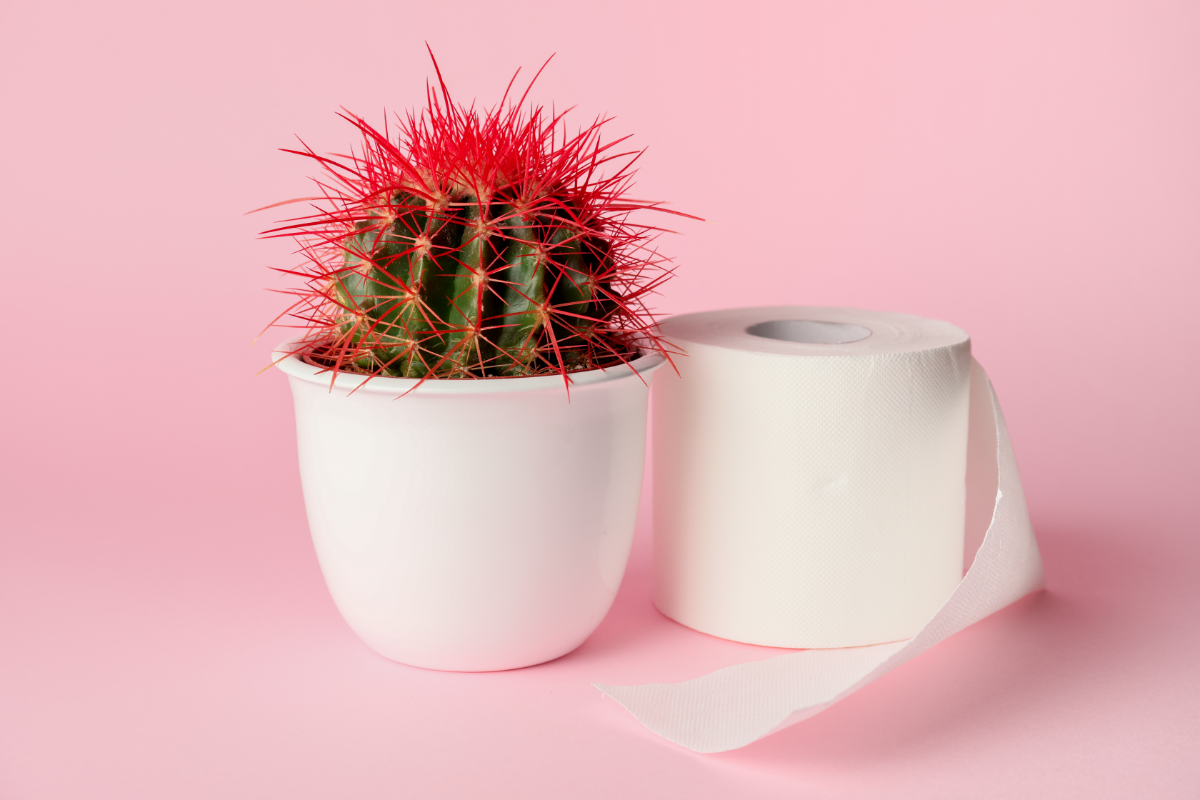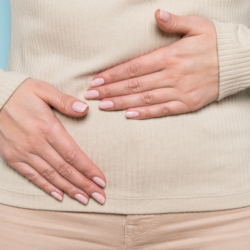Homeopathy offers gentle, naturalsolutions for many health problems, including acute haemorrhoidal accidents. This article guides you through the different homeopathic approaches to effectively relieve the painful symptoms of haemorrhoids. We’ll explore specific remedies adapted to different cases, along with dietary and hygiene advice for holistic management of your well-being. Find out how homeopathy can help you regain comfort and serenity in the face of this common but often taboo problem.
There are two types of haemorrhoidal accident
- Acute haemorrhoidal accidents, which are rapidly relieved by symptomatic homeopathic treatment.
- Recurrent haemorrhoidal attacks, which can be treated either with homeopathic treatment or surgery.
Haemorrhoids take the form of rectal varicose veins, which are regularly observed when several phenomena are combined in the same patient, such as :
- portal hypertension
- a particular constitutional inclination of the subject combining venous fragility and digestive fragility.
These acute haemorrhoidal accidents occur under certain specific conditions:
- Abuse of alcoholic beverages
- Acute or sub-acute enteritis following excessive ingestion of spices or pharmacodynamic substances,
- Childbirth, prolonged exertion, etc.
During these conditions, the haemorrhoidal veins become inflamed and congested, leading to haemorrhage or thrombosis. Their homeopathic treatment therefore combines a treatment administered per os with hygienic and dietetic care.
How do I choose the right homeopathic treatment for haemorrhoids?
Choosing the right treatment for haemorrhoids is not based solely on the symptoms of the condition. It is also important to consider an individual’s predisposition to certain conditions that are apparently unrelated to haemorrhoids. For example, someone with skin problems and a sweet tooth may respond better to lycopodium. Similarly, someone prone to non-irritating rhinitis might find better relief with pulsatilla. However, it can be complicated for someone who is not familiar with homeopathy to make these combinations. In this case, it is advisable to seek the advice of a pharmacist or homeopath for a safer and more appropriate orientation.
Medicines for venous congestion
This section explores homeopathic options specifically targeting venous congestion, a key factor in the treatment of acute haemorrhoids, detailing their mode of action and effectiveness.
Aesculus hippocastanum :
Horse chestnut has also been shown to cause venous plethora with elective haemorrhoidal repercussions. The subject experiences a sensation of rectal fullness, needles in the rectum and dry, burning, striped mucosa.
Dosage: 20 drops of Aesculus hippocastanum 3 DH or 6 DH may be taken systematically, 2 to 4 times a day. The drops should then be diluted in a little pure water and kept in the mouth for a few moments before swallowing.
Arnica montana :
This is the medicine for veins and venous capillaries. In fact, Arnica pathogenetic experiments have shown an elective organotropism for these tissues. There is also a sensation of bruising aggravated by the lightest touch.
Dosage: Take Arnica 7 or 9 CH, in doses of 5 granules every hour or every 2 hours. Then space out the doses as the intensity of the symptoms diminishes.
Carduus marianus :
The remedy Carduus marianus is frequently used in homeopathy to treat haemorrhoids. It is renowned for its effectiveness in relieving the symptoms associated with this condition, such as inflammation, pain and bleeding. Carduus marianus works by improving circulation in the liver area, which can be beneficial in cases where haemorrhoids are linked to liver problems or venous congestion. It also helps to reduce the feeling of heaviness and tension in the affected area.
Recommended dosage: Take Carduus marianus 5CH in doses of 3 granules, 3 or 4 times a day. Space out the doses as the intensity of the symptoms diminishes.
Nux vomica :
This medicine is indicated for the relief of very painful haemorrhoidal accidents; improved by cold or iced applications, occurring following abuse of spices and/or alcoholic beverages in sedentary, sthenic, short-tempered subjects, too often doing good shopping and prone to chronic constipation.
Recommended dosage: Take 5 granules of Nux vomica 7 or 9 CH, 3 to 4 times a day.
Aloe socotrina :
This medicine is used in cases of burning haemorrhoids, which protrude like a bunch of grapes and are bluish in colour. It is also used in patients with concomitant sphincter problems, who involuntarily pass faeces or mucus as thick as jelly.
Dosage: Take 5 or 7 CH, 5 granules 2 times a day.
Sepia officinalis :
In fact, this medicine is used as a symptomatic treatment for acute haemorrhoidal accidents when there is pelvic congestion, constipation, venous return problems in the lower limbs and painful prolapsed haemorrhoids. Pregnancy and childbirth are periods when these conditions are often present.
Recommended dosage: Take 5 granules of Sepia 7 or 9 CH, 2 to 4 times a day.
Medication for bleeding haemorrhoids
Discover here the specific homeopathic treatments for bleeding haemorrhoids, focusing on their effectiveness in soothing and treating these particularly uncomfortable symptoms.
Arnica montana :
This medicine is of course used in the same way as above when, in addition to the sensation of venous congestion and bruising, there is haemorrhoidal rectorrhagia of varying severity.
Collinsonia canadensis :
This medicine is suitable for haemorrhoids with a tendency to bleed, particularly in constipated patients with large stools that are difficult to expel.
Dosage: Take 20 drops of Collinsonia 3 DH or 6 DH, diluted in a little pure water, 2 to 4 times a day. This medicine can be mixed in equal parts with Aesculus hippocastanum.
Hamamelis virginiana :
This substance experimentally causes venous inflammatory phenomena as well as black haemorrhages and sensations of aching or bursting of the veins, with aggravation by heat and the slightest contact.
The dosage is the same as for Collinsonia canadensis, with which it can be combined, as well as Aesculus hippocastanum.
Medicines for haemorrhoidal thrombophlebitis
When faced with an acute painful attack of haemorrhoidal thrombophlebitis, 3 drugs should immediately come to mind: Arnica (already mentioned), Lachesus mutus as well as Muriaticum acidum.
Lachesis mutus :
This medicine is suitable for procident, purplish haemorrhoids with contact hyperaesthesia, throbbing pain or a feeling of constriction of the anus. They are notably improved by bleeding and aggravated by heat.
Muriaticum acidum :
This medicine is used for swollen, dark-blue, protruding, turgid and hyperalgesic haemorrhoids, where the patient is unable to tolerate the slightest contact.
These 3 medicines, Arnica, Lachesis and Muriaticum acidum, all have pathogenic symptoms similar to the clinical reaction modalities of patients suffering from haemorrhoidal thrombosis. They are therefore taken in turn, every hour or every 2 hours, at a dose of 5 granules in 7 or 9 CH. They should be taken at intervals depending on the decrease in symptoms.
Medications for pruritic haemorrhoids
Explore the homeopathic remedies effective against haemorrhoidal pruritus, offering targeted relief for this particularly uncomfortable and persistent symptomatology.
Fluoricum acidum :
This medicine is indicated if pruritic haemorrhoids are bleeding or not, especially if there are varicose veins with heaviness in the lower limbs. Provided that the characteristic pattern of improvement by cold and/or cool showers and aggravation by heat is present.
Paeonia officinalis :
This medicine is chosen for inflammatory haemorrhoids which are painful and very sensitive to the touch, with severe anal pain during and after defecation. The pruritus intensifies with scratching and oozing.
Recommended dosage: Take 20 drops of Peonia officinalis 3 DH or 6 DH, 3 to 4 times a day, diluted in a little pure water.
Ratanhia :
The pathogenic symptoms of this pharmacodynamic substance are similar to those of Paeonia officinalis.
Recommended dosage: take 20 drops of Ratanhia 3 DH or 6 DH, 3 to 4 times a day, diluted in a little pure water.
Hygienic and dietetic care
During an acute attack, spices and alcoholic beverages should be eliminated, and light meals, abundant watery drinks and moderate exercise should be encouraged. On a local level, strict hygiene should be practised, with cleansing after each bowel movement.
Ointments and suppositories act as both decongestants and lubricants. The aim is to facilitate the expulsion of stools. The following products can be recommended:
- Aesculus compound suppositories (2 to 3 per 24 hours).
- Aesculus compound ointment (applied locally after each bowel movement or toilet).
- Ratanhia ointment (for pruritus).
Finally, to support the effectiveness of homeopathic treatment for haemorrhoids, adopt these healthy lifestyle tips. Include fibre-rich foods such as vegetables, fruit and wholegrain cereals in your diet, to help promote smooth digestion. Make sure you’re properly hydrated by drinking water regularly. Physical exercise, even light exercise, is essential to stimulate circulation. Limit prolonged sitting and consider using cushions. These practices will help reduce haemorrhoidal symptoms and prevent them from recurring.
Strategies for preventing haemorrhoids
To minimise the risk of haemorrhoids developing or worsening, experts recommend a series of preventive measures. This advice is based on the recommendations of theEuropean Society of Colo-Proctology and various analyses by experts in the field.
- Diet and hydration: A diet rich in fibre is crucial. Include fruit, vegetables and wholegrain cereals in your daily diet. These foods promote soft, regular bowel movements, preventing constipation, a well-known risk factor for haemorrhoids. Adequate hydration, by drinking enough water, is also important.
- Physical activity: Regular physical activity stimulates circulation and digestion, helping to reduce the risk of haemorrhoids forming. Certain exercises, such as cycling and horse riding, can be avoided if they are uncomfortable or exacerbate symptoms.
- Sitting or Standing Time Management: Avoid standing or sitting for long periods of time. If your job requires such posture, take regular breaks to walk or lie down to promote good blood circulation.
- Food monitoring: Identify foods that seem to trigger haemorrhoidal attacks and limit their consumption. This may include spices, alcohol, coffee and high-fat meals.
- Medication and Constipation: Some medications can contribute to constipation. If you are taking a new treatment, discuss its side effects and how to manage them with your doctor.
- Anal hygiene: Maintain careful anal hygiene by washing regularly with lukewarm water, without using too much soap, to avoid irritation.
These preventive tips are supported by scientific studies and expert consensus, although some are based on limited data. They aim to offer proactive health management and prevent haemorrhoid-related complications.
Preventing recurrent haemorrhoids: is it possible?
To prevent recurrences of haemorrhoids, the use of basic treatments such as sulphur and nux vomica is often recommended. These remedies are generally prescribed in high dilutions of 15 or 30 CH, to be taken in the form of 3 granules every day, or a weekly dose for one to two months. Thereafter, it is advisable to gradually reduce the frequency of use over the following months. At the same time, adopting healthier lifestyle habits is strongly suggested, including increasing physical activity, limiting consumption of spices and alcohol, drinking more water to reduce venous stasis, and avoiding foods likely to cause constipation.
Summary table of homeopathic treatments for haemorrhoidal accidents
| Homeopathic remedy | Indication | Dosage | Frequency of use |
|---|---|---|---|
| Aesculus hippocastanum | Venous congestion, sensation of rectal fullness | 20 drops in 3 DH or 6 DH | 2 to 4 times a day |
| Arnica montana | Veins and venous capillaries, sensation of bruising | 5 granules in 7 CH or 9 CH | Every hour or every 2 hours, spaced out according to improvement |
| Nux vomica | Painful accidents, chronic constipation | 5 granules in 7 CH or 9 CH | 3 to 4 times a day |
| Aloe socotrina | Protruding haemorrhoids, sphincter insecurity | 5 granules in 5 CH or 7 CH | 2 times a day |
| Sepia officinalis | Pelvic congestion, prolapsed haemorrhoids | 5 granules in 7 CH or 9 CH | 2 to 4 times a day |
| Collinsonia canadensis | Bleeding haemorrhoids, constipation | 20 drops in 3 or 6 DH | 2 to 4 times a day |
| Hamamelis virginiana | Venous inflammation, haemorrhage | Similar dosage to Collinsonia | As required |
| Lachesis mutus | Procidental haemorrhoids, throbbing pain | 5 granules in 7 CH or 9 CH | Every hour or 2 hours |
| Muriaticum acidum | Swollen, dark blue, hyperalgesic haemorrhoids | 5 granules in 7 CH or 9 CH | Every hour or 2 hours |
| Fluoricum acidum | Pruritic haemorrhoids, varicose veins | To be determined according to symptoms | As required |
| Paeonia officinalis | Inflammatory haemorrhoids, anal pain | 20 drops in 3 DH or 6 DH | 3 to 4 times a day |
| Ratanhia | Symptoms similar to Paeonia | 20 drops in 3 or 6 DH | 3 to 4 times a day |
This information is provided as an example and does not replace consultation with a healthcare professional. It is essential to consult a homeopath for personalised advice tailored to your specific situation.







